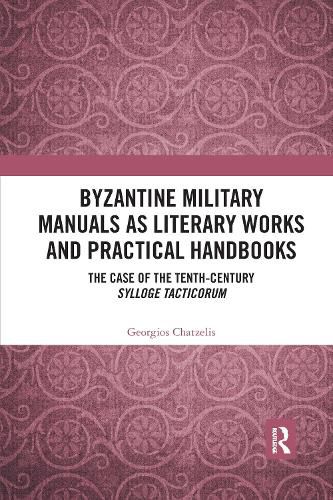Readings Newsletter
Become a Readings Member to make your shopping experience even easier.
Sign in or sign up for free!
You’re not far away from qualifying for FREE standard shipping within Australia
You’ve qualified for FREE standard shipping within Australia
The cart is loading…






This book studies the Sylloge Tacticorum, an important tenth-century Byzantine military manual. The text is used as a case study to connect military manuals with the challenges that Byzantium faced in its wars with the Arabs, but also with other aspects of Byzantine society such as education, politics, and conventions in the productions of literary texts and historical narratives.
The book explores when the Sylloge was written and by whom. It identifies which passages from classical or earlier works were incorporated in the Sylloge and explains the reason why Byzantines imitated works of the past. The book then studies the extent to which the Sylloge was original and how innovation and originality were received in Byzantine society. Despite the imitation, the author of the Sylloge adapted and updated his material to reflect the current operational needs as well as the ideological, cultural and religious context of his time. Finally, the book attempts to estimate the extent to which Byzantine generals followed the advice of military manuals, and to explore whether historical narratives can be safely used to draw information as to how the Byzantines and the Arabs fought.
Therefore, along with a detailed study of the Sylloge Tacticorum, this monograph also addresses broader issues of the pen and the sword such as military manuals in connection with Byzantine warfare, politics, literature, historiography and education.
$9.00 standard shipping within Australia
FREE standard shipping within Australia for orders over $100.00
Express & International shipping calculated at checkout
This book studies the Sylloge Tacticorum, an important tenth-century Byzantine military manual. The text is used as a case study to connect military manuals with the challenges that Byzantium faced in its wars with the Arabs, but also with other aspects of Byzantine society such as education, politics, and conventions in the productions of literary texts and historical narratives.
The book explores when the Sylloge was written and by whom. It identifies which passages from classical or earlier works were incorporated in the Sylloge and explains the reason why Byzantines imitated works of the past. The book then studies the extent to which the Sylloge was original and how innovation and originality were received in Byzantine society. Despite the imitation, the author of the Sylloge adapted and updated his material to reflect the current operational needs as well as the ideological, cultural and religious context of his time. Finally, the book attempts to estimate the extent to which Byzantine generals followed the advice of military manuals, and to explore whether historical narratives can be safely used to draw information as to how the Byzantines and the Arabs fought.
Therefore, along with a detailed study of the Sylloge Tacticorum, this monograph also addresses broader issues of the pen and the sword such as military manuals in connection with Byzantine warfare, politics, literature, historiography and education.